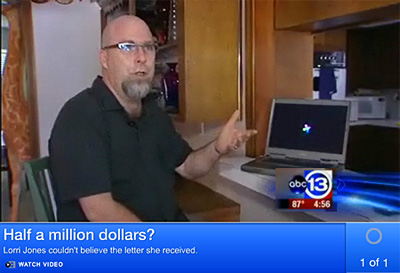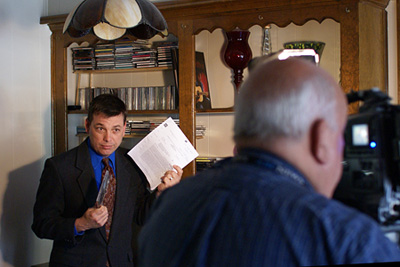
Lori Jones here in Houston got a letter from lawyers representing the RIAA indicating she is being sued for copyright infringement to the tune of over half a million dollars. Apparently her daughter had downloaded and installed Limewire to share music.
According to the lawsuit the half-million dollar price tag works out to $750 per infringement. That’s $750 per song. Pretty steep considering you can purchase the songs at the iTunes store for 99 cents a pop. On the plus side, they are willing to settle for a one time fee of $4,000.
You can see the whole story here.
Jeff Ehling from the local ABC affiliate station here in Houston, TX called me to setup an interview. Since I had taken the day off we did it in the comfort of my living room.

Strangely, this time I was only referred to as:
Jay Lee who hosts a radio program that specializes in computer issues
“Strangely, this time I was only referred to as:
Jay Lee who hosts a radio program that specializes in computer issues”
THAT’S BECAUSE i AM NOT PRODUCING JEFF’S SEGMENT ANYMORE!
Was she being sued because she’d been uploading music files or because she’d been downloading files or both? I ask because I know a LOT of people who use Limewire just to download, but they never upload anything themselves.
I hope this is useful:
http://yro.slashdot.org/article.pl?no_d2=1&sid=08/03/14/158246
Here is one more:
http://yro.slashdot.org/article.pl?no_d2=1&sid=08/03/15/1915249
“Recommended reading for all interested in the RIAA’s litigation war against p2p file sharing is the amended class action complaint just filed in Oregon in Andersen v. Atlantic. This landmark 109-page document (pdf) tells both the general story of the RIAA’s campaign against ordinary folks, and the specific story of its harassment of Tanya Andersen, and even of her young daughter. The complaint includes federal and state RICO claims, as well as other legal theories, and alleges that “The world’s four major recording studios had devised an illegal enterprise intent on maintaining their virtually complete monopoly over the distribution of recorded music.” The point has been made by one commentator that the RIAA won’t be able to weasel its out of this one by simply withdrawing it; this one, they will have to answer for. If the relief requested in the complaint is granted, the RIAA’s entire campaign will be shut down for good.”